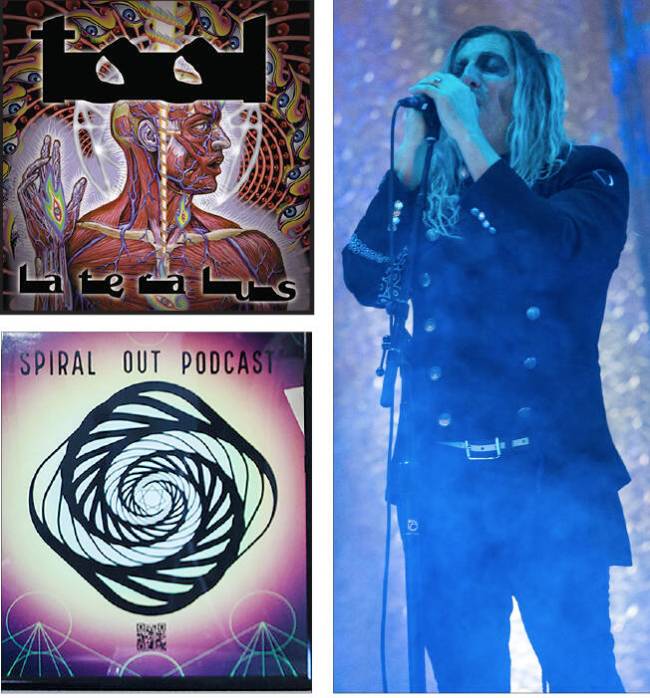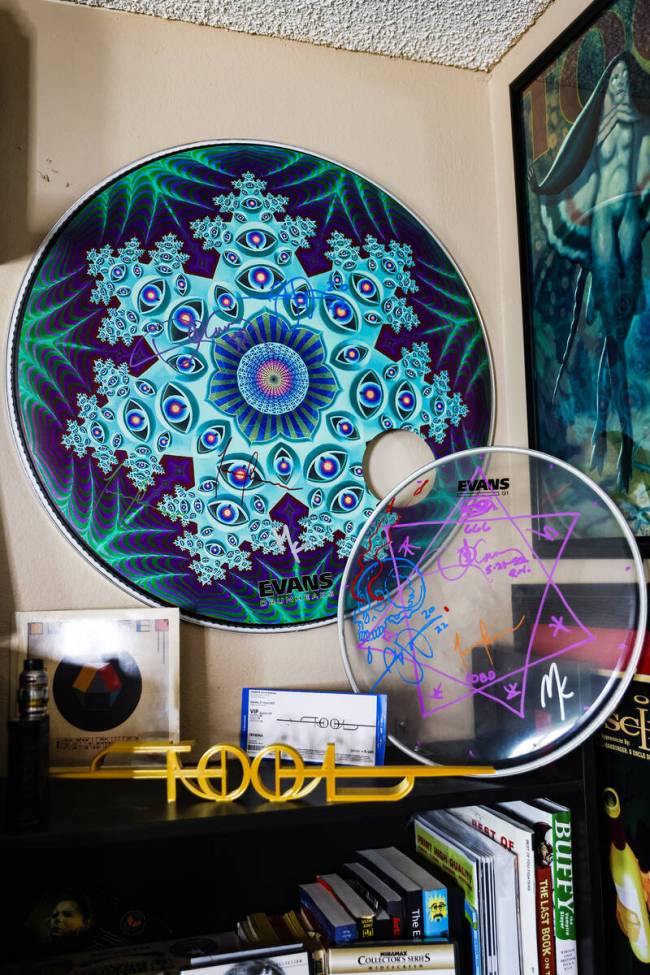A Collector’s Odyssey: Weird band, weird fans and ‘riding the spiral’
In January, a 34-year-old Las Vegas chef named Kristopher West was in San Diego for work when he found a cheap ticket to see the prog-metal band Tool. Ever since high school, West had been drawn to Tool’s musicianship and spectacularly weird artistic vision that encompassed everything from album art to concert lighting to cryptic self-presentation.
West had seen Tool in concert more than a dozen times over nearly two decades but had recently tired of their less-than-fan-friendly antics, like the last-minute cancellation and then reinstatement of pricey VIP tickets for a show later that month in Vegas. But West had a free evening and wasn’t so fed up as to pass up an $80 ticket when scalpers regularly charge $300 or more for the often sold-out shows.
Arriving early, West noticed fans milling about the merch booth. With money to spend and time to kill, he joined the line. A fan behind West struck up a conversation and urged him to buy two posters if he could. He followed the advice, grabbing two $70 limited-edition Ryan Heshka prints depicting a nunlike figure following a man in a gas mask.
As West left the line, another fan offered to pay $200 for his extra poster — triple what West had just paid. His new friend in line overheard the exchange and interrupted: “He’ll take $300,” the man told the buyer.
Without hesitation, the buyer peeled off three blue Benjamins. In a few minutes, West had made enough to cover the concert ticket, the poster he was keeping and pocket a profit of nearly $150.
He was shocked that fans thought nothing of paying more than four times the print’s face value. Walking to his seat, West noticed other buyers loaded down with bags of swag and running from booth to booth to get a first crack at rare items. He pulled out his phone and searched for sites specifically dedicated to the gold-and-glory rush for Tool concert merch. Finding nothing, West, who had previously produced a podcast on mental health, vowed to cover the topic. Two months later, he released the first episode of his Spiral Out podcast, named after lyrics in the title song of Tool’s seminal 2001 album, Lateralus.
West’s journey into the community, commerce and controversy around the Tool art and collectors would send him around the country and across the Atlantic. He would meet a constellation of fans orbiting the notoriously secretive and enigmatic band and join in their obsession and ritual.
West had joined a long line of dedicated memorabilia collectors who yearned for objects that bring them closer to the objects of their obsession. University of North Carolina music professor Mark Katz studies collectors of vinyl records in the era of digital music. Music is often such a transitory experience, he says, that fans need something to hold onto after the show ends. “These are material objects that represent immaterial experiences,” he says. In other words, fans cherish swag because it evokes memories.
There is of course, another tradition, now supercharged by online markets: profiting off the obsessions of others. Notwithstanding the sweet deal he turned in San Diego, West identifies more with the obsessives than the salesmen.
West grew up poor in Los Angeles. His mother, who struggled with mental health and substance abuse, moved them into apartments with first-month specials. They would stay as long as they could before eviction. She never told West’s father where they were going. After searching for half a decade, West’s father found him at about age 7 and gave him some stability. But when West’s father moved the family to Eugene, Oregon, in 2002,West couldn’t adjust to semi-rural life. After eight months, he hopped a bus to Las Vegas, where his mother had moved in with her father,who became an inspiring figure in West’s life. On West’s 17th birthday, his grandfather died of a heart attack.
Dr. Shirley Mueller, a neurologist who studied collectors for her book, Inside the Head of a Collector: Neuropsychological Forces at Play, references Freud’s theory that collecting makes up for a deprived childhood. While Freud has plenty of modern detractors — including Mueller — the idea seems to apply to West.
In 2001, a friend at Las Vegas’ Will Rogers Middle School turned West on to Tool, explaining the songs’ esoteric time signatures and mathematical structures. West had never heard anything like it. He’d always loved the arts, and this music struck him as art. He’d played soccer and football in school, but now he abandoned them for music. He played in bands, becoming competent on several instruments, including the drums. With no money, West became adept at sneaking into Las Vegas concerts. He would get there early when ticket takers might not be well organized. He found that if you acted like you belonged, no one usually questioned you.
After one show, he noticed a group waiting to go backstage and just followed. Inside, someone stuck a back-stage pass on him. West saw 6-foot-5-inch Tool drummer Danny Carey towering over the crowd, but he was too nervous to approach. Carey came by and signed his show ticket. Despite a house now filled with Tool swag that West values at $50,000, that ticket is still one of his most prized possessions.
West dabbled in other artistic endeavors. He studied film at College of Southern Nevada, getting production and stunt assistant jobs in films like The Hangover. When film work in Vegas dried up, he dropped out of college and pursued a career in the culinary arts, moving from dishwasher to cook and eventually to training other chefs for nursing homes and rehab facilities. He finally had a steady job, some security and money.
Security means many things to many people. For West, it meant this: more Tool.
Tool, gently stated, is a weird band. And when a weird band finds its weird fans, bonds form that are not easily broken. “When someone identifies with the avant-garde, they value becoming exclusive and in the company of elite others who are also ‘in the know,’ ” says retired University of Tulsa professor Joli Jensen, an expert in fan cultures. Membership in the in-group, Katz adds, offers more than status: “It allows you to be with weirdos like yourself.”
Since emerging from Los Angeles in the early 1990s, Tool has made a career out of being obscure weirdos. The band’s timing was good. Record companies were searching for alternative music, like Nirvana, which was sweeping out the last vestiges of hair metal. Tool, Rage Against the Machine and Deftones quickly built a large following. 
Despite living in poverty at the time, Tool chose a record deal that offered less money but guaranteed more artistic control. Their MTV videos stood out for their dark Claymation in contrast with other bands whose videos focused on themselves. Tool guitarist Adam Jones, whose day job then was creating special effects for Jurassic Park and Terminator 2: Judgment Day, spearheaded the band’s visuals.
Tool also didn’t make radio a big priority. In 1996, the band released a nearly 7-minute, profanity laced “single” that yearned for their adoptive hometown to fall into the Pacific Ocean. For stations that dared to play the song — which screams words you can’t say on the radio at annoying L.A. residents such as “gun-toting gangster wannabes” and “L. Ron Hubbard” — it was just a series of bleeps over the airwaves.
Tool took about five years each to craft their third and fourth studio albums. Then it took them 13 years to release Fear Inoculum in 2019. That same year, Tool allowed streaming services to play their music for the first time. The album shot up the charts, besting pop favorites like Taylor Swift. That’s despite the CD costing $60 because it had a 2-by-4-inch, rechargeable screen that played videos.
For the tour, which COVID-19 interrupted, Tool stepped up its merch game. Jones commissioned a different artist to produce a limited-edition print and T-shirt for each show. Then the band signed a handful of the prints and doodled others with skulls or other art, increasing the value and scarcity. The band also sold Carey’s colorful, album art-inspired bass drumheads used at prior shows and signed by the band. With only one or two available for each show, the $1,500 drumheads became collecting “grails” and quickly commanded $5,000 or more on the secondary market. The prints, T-shirts and other limited-edition items more than tripled or quadrupled in value the minute they left the merch booth.
Tool is one of the last bands tapping into the album-oriented rock and art that started in the 1960s but was mostly abandoned after streaming became popular. The album era, says Mark Katz, the music professor, was an anomaly; singles and even sheet music of individual songs are the historical norm. Starting in the late 1960s, though, some rock musicians wanted to be taken seriously as artists and separate themselves from the teeny-boppers. Pink Floyd, Led Zeppelin and Black Sabbath albums were often intricate productions of music and cover art with foldouts, posters and multiple discs. Tool has taken up that mantle and threaded the needle between maintaining integrity and making big bucks.
“They’re smart entrepreneurs,” Katz says, “and have taken a savvy approach to monetizing art but still being authentic.”
West insists he was never much of a collector until he found what he terms “the Tooliverse” at that San Diego show. But Bryan Paulson, West’s high school buddy, says that even before West dove headfirst into collecting, he would go to great lengths to get a piece of the band.
In 2006, when West took Paulson to Las Vegas’ Hard Rock Hotel & Casino for Paulson’s first Tool show, he dragged him toward the stage. West made it clear that if his idol, Carey, threw anything into the crowd they would do whatever it took to get it. Sure enough, the famed percussionist chucked one of his sticks into the audience and dozens of fans scrambled. West emerged from the scrum with the prize in hand.
Since the revelatory experience in San Diego, West has used his downtime during work trips to record podcast episodes in hotel rooms. He recorded his 21st episode of Spiral Out in October; creating the show, he says, has not only helped him understand the Tooliverse, but also upped his collecting game. “I fell into this serendipitously,” he says. “It felt natural. I didn’t seek it. It found me.”
About two weeks after the San Diego show, West flew to New Orleans to catch Tool. For collectors, VIP tickets, while pricey at $500 a seat, are worth it: They get fans in early for a first crack at limited-edition items. West only had general admission seats in New Orleans, but he found a way to get the poster he craved.
“If you have VIP, you’re going to get something,” he says. “If you’re general admission, it’s a whole other level of planning and strategy.”
In New Orleans, West scanned the booths to figure out where VIPs plundered the good stuff and searched for stands that might still hide treasures. “It’s a game, and I want to win that game,” he says. “I figure out a way to win. I’ve been lucky enough to not have lost when it comes to getting a poster.”
On the fifth episode of Spiral Out, West interviewed Rodney Rohrs, a true memorabilia-hunting machine. Rohrs, a 48-year-old from St. Petersburg, Florida, went so far as to delegate management of his successful employment agency to his employees so he could attend 20 shows on Tool’s last tour and collect more than 500 Tool items. He regularly gets in line outside the venue 12 hours before the show. In St. Louis, he was in line for 34 hours.
“It’s an addiction, and it’s strong,” Rohrs admits, adding he plans to build a Tool merch museum in Florida to display his collection. That collection includes several versions of the ultimate Tool “grail” — a drumhead, the one object that had long eluded West.
To get his grail, West decided to wade into a Tool-collector Facebook group and offer a collection of rare posters in exchange for a drumhead. Rohrs counseled him that no one would trade a drum for posters, but West proved him wrong.
Despite the win, West has some trader’s remorse. “I probably shouldn’t have done the drum. I gave up things that I regret not having.”
Then he pauses, thinks and changes his mind: Nope, he’s glad he’s got that grail. 
On the third episode of Spiral Out, West’s guest was poster artist Alex Kuno. West had secured a rare treasure: a Tool poster by Kuno with a “remark” from the artist. A “remark” is an artist’s hand-drawn addition to the the poster, making it a unique piece. On West’s poster, Kuno had drawn a spiral and microphone as a nod to his podcast. The print hangs prominently in the podcast room of the modest northwest Las Vegas house West shares with his girlfriend and rescue pit bulls.
Adam Jones, the tool guitarist, had contacted Kuno through Instagram to make a show poster, paying $1,000 and sending the artist 50 copies of the final print. Kuno planned to sell them for $50 each until a fan tipped him off that he could sell them for $750 to $1,200 if he did a remark. “I had no idea this existed at all,” Kuno says, “and I knew nothing about the collectors.”
Poster sales gave Kuno a financial cushion for the first time. He sold posters on his website in lots — or “drops” — of 10 to give himself time to do the remarks. For months, each drop sold out instantly.
But his June drop sparked zero interest. “I was told, ‘We’re burned out, the touring is done, gas prices are high.’”
Tool’s touring kept West on the road all spring. He decided to attend the last three shows of the U.S. tour in March, flying Paulson down for the St. Louis gig.
Paulson said he found West in Missouri, surviving on no sleep as he looked for ways to improve his merch game. The night before the last show in Cleveland, an unidentified bug bit West, causing a severe reaction. “We wanted to take him to the hospital,” Paulson says. “But he pushed through. For Kris, Tool is self-medication.”
In May, West flew overseas for the first time to catch the tour’s last dates in Krakow, Prague and Budapest. He had heard that European fans weren’t as skilled at the merch game, so he figured to make a big score — maybe another drumhead.
Instead, he ran into corruption, language barriers and hassles from security. In Poland, West watched as a local who knew security got in early to take some pictures at the sound check. The insider scored the coveted drumhead.
At the tour’s last show in Hungary, a friend put West on the guest list, but wandering the industrial wasteland around the arena, West couldn’t find the check-in area. He finally found an open door, but security grabbed him, confiscated his ticket and threatened to have him arrested.
Maybe his years of experience in sneaking into shows helped West, but he did not panic despite being in a foreign country with a language he didn’t speak and a judicial system he didn’t understand. He figured the worst thing that would happen was he’d be kicked out, and he could always buy another ticket. He was eventually released and found himself still on the list to see the show.
“I’m in Europe seeing Tool,” he says. “I already won. The question is, How much am I going to win?”
When the tour ended, West was reluctant to stop. He drove to Jerome, Arizona, where Tool frontman Maynard James Keenan lives. In the small hilly farm town, Keenan runs a winery, a tasting room and a store dedicated to his side band, Puscifer. West caught two Puscifer shows. His big score was two copies of Puscifer’s Brooklyn show poster by famed artist Emek. The posters that sold for $75 at the show are fetching $1,000-plus online. West bought one poster online and won the second in a Facebook raffle after buying 10 spots for $100.
West’s connection to the band has changed over time. “At 15, 16, 17 and my early 20s, I was searching for something and thought they had the answers,” he said. “It was a mysterious band talking some profound s**t. Getting older, I realize I’m not going to get some enlightenment and not find all the answers to problems at a Tool show.”
But in August, West hopped in his Kia and drove to Los Angeles to see Carey play with his jazz band at a small club. West clearly doesn’t want the trip to end. It would even be nice, he says, to make a career out of the podcast. But his real goal is simply to live the experience — to “ride the spiral.”
“It’s died down a lot, even the community’s drive to get a drumhead,” he says. “At least until the next tour.” ◆













